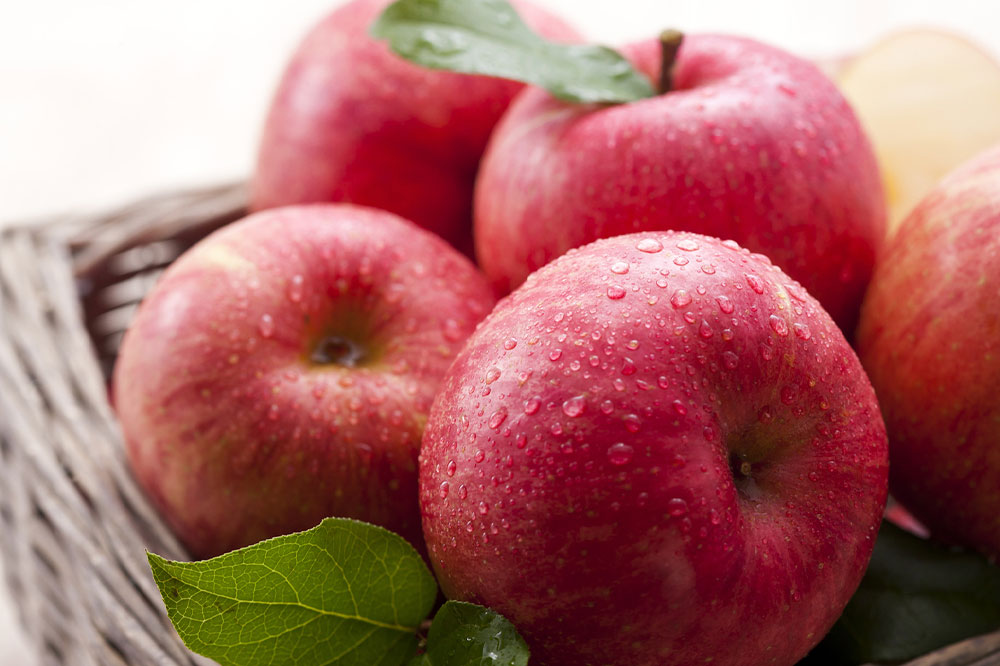20 Nutritious Foods for Better Lung Health

Good lung health is crucial for overall well-being. Environmental toxins, poor lifestyle habits, and inflammatory foods can damage the lungs and lead to chronic obstructive pulmonary disease (COPD), asthma, pulmonary fibrosis, and other conditions that can significantly impact one’s quality of life. Adding nutritious foods to the meals can help mitigate some of this damage and reduce the symptoms and severity of lung disease. Try these 20 foods to boost lung function and improve breathing.
Apples
Research suggests that those who eat at least five apples a week are less likely to develop COPD. Apples contain an antioxidant called quercetin, which slows lung function decline. The fruit also helps lower the risk of asthma and lung cancer owing to its flavonoids and vitamin C content.
Beetroots
Beetroots and beet greens are rich sources of nitrates, which can help optimize lung function, relax blood vessels, and reduce blood pressure. Beets are also packed with beneficial nutrients, such as magnesium, potassium, vitamin C, and carotenoid antioxidants. Beetroot (in its natural form or as a supplement) is known to improve physical performance and lung function in those with COPD and pulmonary hypertension.
Peppers
Peppers are rich in vitamin C, a vitamin that has been shown to improve lung function. Vitamin C is a potent antioxidant that helps fight off free radicals in the body, thus improving its overall functioning. Spicy peepers also help thin the mucus, relieving chronic bronchitis flare-ups.
Pumpkins
Pumpkins contain carotene compounds with anti-inflammatory properties and antioxidant properties, such as beta-carotene, lutein, and zeaxanthin. These antioxidants improve lung function in people of all ages.
Turmeric
Turmeric is a popular ingredient used in many Southeast Asian dishes. Its antioxidant and anti-inflammatory properties are generally attributed to its main active ingredient, curcumin. Turmeric is particularly helpful for those with chronic inflammation, as it reduces the impact of free radicals and environmental toxins on the body’s vital organs.
Tomatoes
Tomatoes are a great source of a carotenoid antioxidant called lycopene. Lycopene has been proven to help reduce inflammation among people with asthma and improve lung function for those with COPD.
Blueberries
Blueberries are loaded with fiber and a general category of antioxidants called anthocyanins. Examples include malvidin, cyanidin, peonidin, delphinidin, and petunidin. These antioxidants can help protect the lung tissue from oxidative damage caused by free radicals. Research also suggests that people who eat foods high in fiber are less likely to develop respiratory conditions.
Red cabbage
Red cabbage is also an affordable and rich source of anthocyanins and fiber, which can help protect lung function and promote better breathing.
Green tea
Green tea contains a catechin called epigallocatechin gallate (EGCG). It has antioxidant and anti-inflammatory properties and has been shown to reduce the scarring of tissues. Drinking hot green tea at least twice a day can help reduce the risk of COPD and improve symptoms like coughing during a chronic bronchitis flare-up.
Oysters
Oysters are a great source of nutrients like vitamin B, zinc, copper, and selenium, all of which have been linked to promoting lung health. According to studies, people with higher levels of selenium and copper in their blood are less likely to develop lung diseases. Vitamin B and zinc, too, are vital for promoting overall health and reducing the risk of COPD.
Edamame
Edamame beans contain isoflavones, which may reduce the risk of many health conditions, including COPD. A healthy intake of isoflavone can also help people improve their lung function and reduce the occurrence of shortness of breath.
Olive oil
Olive oil has concentrated amounts of antioxidants like polyphenols and vitamin E. These compounds protect people against lung diseases like asthma.
Coffee
Coffee is rich in caffeine and antioxidants, which can help promote lung health and function. Coffee helps open up the blood vessels, promoting blood flow. This process is known as vasodilation or bronchodilation and can temporarily help mitigate the symptoms of lung conditions like asthma. According to the FDA, adults may safely consume up to 400 milligrams of caffeine (or four to five cups of coffee) daily.
Yogurt
Yogurt contains nutrients like calcium, potassium, phosphorus, and selenium. All of these are associated with improved lung health and reduced risk of COPD.
Brazil nuts
Brazil nuts contain the highest amount of selenium, with one single nut possibly containing more than 150% of the recommended daily dose. A healthy intake of selenium may help build immunity against lung cancer, improve respiratory function, and improve overall lung health.
Lentils
Lentils contain copper, magnesium, potassium, and iron, which are essential nutrients for lung health. They are also a rich source of fiber and can help reduce the likelihood of COPD.
Cocoa
Cocoa products like dark chocolate contain flavonoids and theobromine. While the former has antioxidant and anti-inflammatory properties, the latter has been associated with relaxing the airways in the lungs, relieving the symptoms of lung conditions. These compounds may also help protect against lung cancer.
Anchovies
Anchovies are rich in anti-inflammatory nutrients like omega-3 fats, selenium, calcium, and iron. According to studies, higher consumption of omega-3 has been associated with improved lung function and reduced severity of conditions like COPD.
Swiss chard
Swiss chard, a dark leafy green vegetable, is a rich source of magnesium. Besides having anti-inflammatory effects, magnesium helps the bronchioles relax, reducing chronic bronchitis flare-ups. Lower levels of magnesium have been linked to more severe symptoms of COPD.
Barley
Barley is an excellent source of fiber, flavonoids, and vitamin E, which have all been shown to reduce the risk of lung diseases and improve overall health.
Making lifestyle changes and eating healthy foods is an excellent way to promote overall health and reduce the risk of lung disease. However, it is advisable to consult a doctor before making changes to the nutrition plan.
















